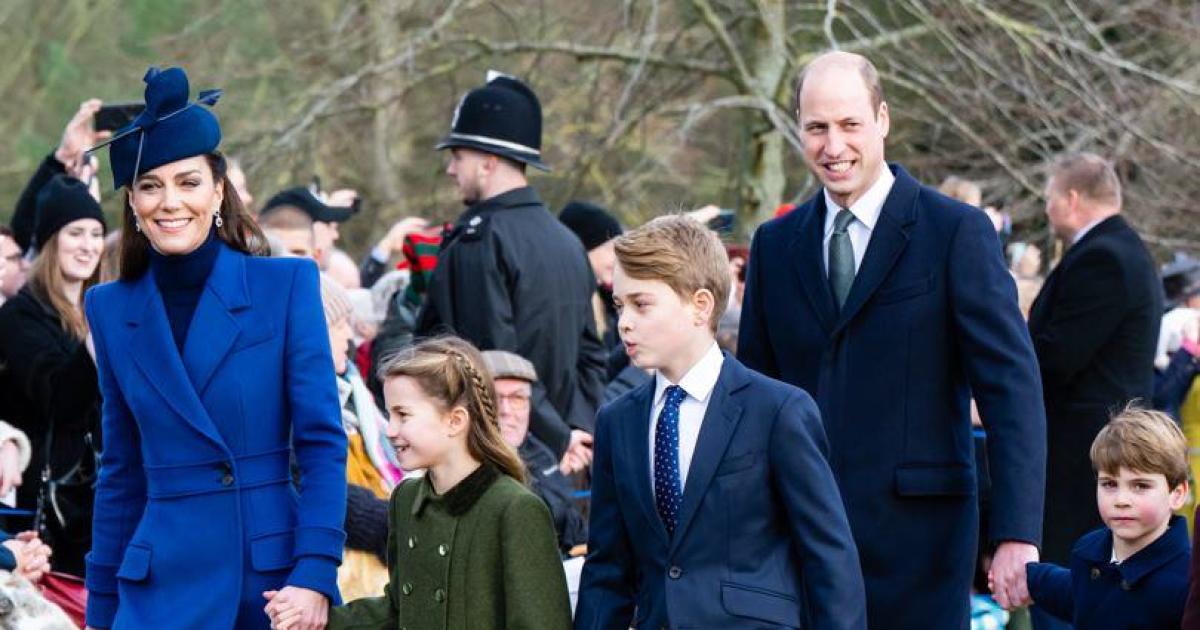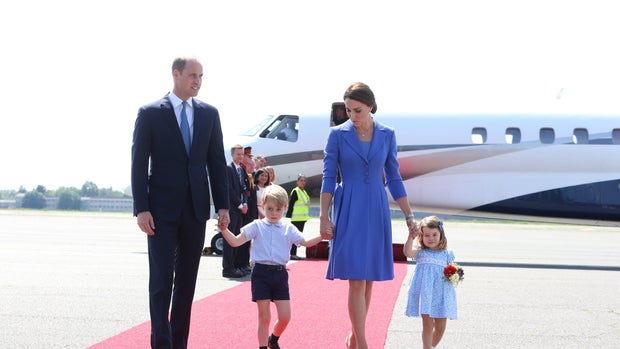CBS News
Princess Kate’s cancer diagnosis highlights balancing act between celebrity and royals’ private lives

The announcement by Catherine, the Princess of Wales, of her cancer diagnosis and treatment has led to a reckoning about how members of the royal family are treated and covered in the media, and about how much privacy they can expect to enjoy as some of the world’s most recognizable individuals.
CBS News royal contributor and royal biographer Tina Brown said seeing Kate, as the princess is commonly known, deliver her news in the video announcement released Friday was “absolutely heart-breaking.”
“I mean, here was this brave, composed, you know, marvelously dignified young woman, talking about something that was deeply shocking and traumatic for her and her family,” said Brown.
But Brown and other royal insiders say while there has been unfair and even gratuitous speculation over Kate’s condition over the last few weeks, there may be lessons for the royal family — and their public relations teams — to take on board as the centuries-old institution continues adapting to our modern world.
Is Princess Kate owed an apology?
Not long after Kate and her husband Prince William’s official Kensington Palace residence announced the Princess of Wales’ surgery and said she would be recovering privately, with no updates expected, the social media rumor mill went into overdrive.
Despite the declaration that there would be no updates, the royal couple posted a U.K. Mother’s Day photo on their official social media pages on March 10 that appeared, at a first glance, to show Kate looking happy and healthy with her children. But Kate was quickly forced to issue an apology of her own, admitting she’d edited the image.
The photo released to quell rumors ended up fueling them, with social media networks abuzz with people suggesting everything from marital problems to a range of unfounded health issues.
“I think that the apologies that are owed are some of these really salacious, horrible things that went on,” Brown said. “There were a lot of mean things. There were lots and lots of jokes.”
Kate, Brown said, had been “ridiculously overwhelmed with all of the trolling and the mad theories and the crazy things that have been said, and she was simply backstage, or struggling with something that was really shocking and upsetting for her and her family.”
“I think we have to really cut them some slack about it at this point. They are people at the end of the day,” Brown said.
Did Kensington Palace get it wrong?
Even for the elite public relations teams on the royal payrolls, this year has brought a series of formidable challenges, and Brown said Kate’s health problems coming in unison with William’s father King Charles III’s own cancer treatment likely added another layer of stress for the family, and may have caused some “chaos.”
Brown said William and Kate were initially dealing with the possibility that “they may be king and queen much quicker than they thought — maybe even in the next couple of years if things go wrong — and she has this shocking diagnosis… Plus three young children who she has to tell and handle, and at the schoolyard, people are obviously saying, ‘What’s wrong with your mommy?’ All these things. I think that there was genuine chaos behind the scenes as they’ve been trying to juggle it all.”
Brown said if she had been advising Kensington Palace on how to handle the public’s insatiable appetite for news about Kate’s recovery, she would have suggested showing the world, literally, how the princess was getting on, and she said the decision to share essentially nothing may have been down to William.
“I would like to have seen that happen a lot earlier, actually, and yes, they did make a complete mess of it, but I’m actually really told that some of it was because William really feels he is going to say, ‘My family do not have to say anything about their private lives.’ So, it’s almost as if he’s telling… the communications apparatus, ‘I don’t want to do this.'”
Brown said “there was argument inside” the palace that it should have provided more in the way of updates. She suggested Kate could merely have appeared earlier on, giving “a wave from the window” or some other signal of her recovery, but that wasn’t done.
In the absence of information, Brown said, “it created a vacuum in which all these terrible rumors poured.”
“The royal family is an incredible, incredibly powerful, tax-funded institution,” Brown said. “Billions of taxpayer dollars support it. Rather than trying to shame people for wondering where she was and all these botched social media moments, why didn’t they use it as a teachable moment about cancer — about empathy — from the jump?”
“But they didn’t do it, and, as I say, we can’t really judge, because what they’re dealing with is so incredible.”
How much privacy should the royals get?
“Members of the royal family understand that they have a public role, but they also feel that there is a private side to their lives. That’s their relationships, that’s their family, and absolutely that’s their health,” said CBS News royal contributor Julian Payne, who previously served as communications director for then-Prince Charles. “They understand that there is interest there, but they will absolutely want to control how they share that information on their own terms, and I don’t think anybody, certainly in the U.K., begrudges them that approach.”
He said that while other kinds of celebrities may understand intense media interest “is integral to the work that they do, for the royal family, I don’t think they view it that same way.”
The royals, whom Payne noted are born or married into their roles, rather than seeking them out, “like to be able to have a line where they do have a private life. They are under such scrutiny all the time that it is really important that they are able to occasionally shut the door and say, ‘Now I’m going back to my own private time.”
Will this change the way the royals share information?
“I think that the members of the family and the institution itself learn all the time,” Payne told CBS News on Monday. “They evolve all the time, and I am absolutely sure that these incredibly difficult last couple of months will give them pause about how they go about sharing information, how long they can maintain that privacy for.”
“I think it’s absolutely right that they seek to protect their private issues around their health, around their relationships, but they do understand that the world is changing and there is more and more interest in people’s private lives,” he said, adding that William, Kate and the rest of their family “are going to have to work hard to continue to protect that space.”
“I think this is what’s so interesting about what we’re seeing now — is it still possible to hold the line between your public role and a private life? And I am absolutely sure that if you ask the family, they would say, ‘Yes, it is.’ They understand the interest, but they also understand that they have a right to privacy, especially around things like their health and wellbeing.”
CBS News
Social Security Fairness Act passes U.S. Senate

Legislation to expand Social Security benefits to millions of Americans passed the U.S. Senate early Saturday and is now headed to the desk of President Joe Biden, who is expected to sign the measure into law.
Senators voted 76-20 for the Social Security Fairness Act, which would eliminate two federal policies that prevent nearly 3 million people, including police officers, firefighters, postal workers, teachers and others with a public pension, from collecting their full Social Security benefits. The legislation has been decades in the making, as the Senate held its first hearings into the policies in 2003.
“The Senate finally corrects a 50-year mistake,” proclaimed Senate Majority Leader Chuck Schumer, a Democrat from New York, after senators approved the legislation at 12:15 a.m. Saturday.
The bill’s passage is “a monumental victory for millions of public service workers who have been denied the full benefits they’ve rightfully earned,” said Shannon Benton, executive director for the Senior Citizens League, which advocates for retirees and which has long pushed for the expansion of Social Security benefits. “This legislation finally restores fairness to the system and ensures the hard work of teachers, first responders and countless public employees is truly recognized.”
The vote came down to the wire, as the Senate looked to wrap up its current session. Senators rejected four amendments and a budgetary point of order late Friday night that would have derailed the measure, given the small window of time left to pass it.
Vice President-elect JD Vance of Ohio was among the 24 Republican senators to join 49 Democrats to advance the measure in an initial procedural vote that took place Wednesday.
“Social Security is a bedrock of our middle class. You pay into it for 40 quarters, you earned it, it should be there when you retire,” Ohio Senator Sherrod Brown, a Democrat who lost his seat in the November election, told the chamber ahead of Wednesday’s vote. “All these workers are asking for is for what they earned.”
What is the Social Security Fairness Act?
The Social Security Fairness Act would repeal two federal policies — the Windfall Elimination Provision (WEP) and the Government Pension Offset (GPO) — that reduce Social Security payments to nearly 3 million retirees.
That includes those who also collect pensions from state and federal jobs that aren’t covered by Social Security, including teachers, police officers and U.S. postal workers. The bill would also end a second provision that reduces Social Security benefits for those workers’ surviving spouses and family members. The WEP impacts about 2 million Social Security beneficiaries and the GPO nearly 800,000 retirees.
The measure, which passed the House in November, had 62 cosponsors when it was introduced in the Senate last year. Yet the bill’s bipartisan support eroded in recent days, with some Republican lawmakers voicing doubts due to its cost. According to the Congressional Budget Office, the proposed legislation would add a projected $195 billion to federal deficits over a decade.
Without Senate approval, the bill’s fate would have ended with the current session of Congress and would have needed to be re-introduced in the next Congress.
CBS News
12/20: CBS Evening News – CBS News

Watch CBS News
Be the first to know
Get browser notifications for breaking news, live events, and exclusive reporting.
CBS News
Saturday is the winter solstice and 2024’s shortest day. Here’s what to know about the official start of winter.

The 2024 winter solstice, the shortest day of the year, happens on Saturday, Dec. 21, in the Northern Hemisphere. The celestial event signifies the first day of winter, astronomically.
What is the winter solstice?
The winter solstice is the day each year that has the shortest period of daylight between sunrise and sunset, and therefore the longest night. It happens when the sun is directly above the Tropic of Capricorn, a line of latitude that circles the globe south of the equator, the National Weather Service explains.
The farther north you are, the shorter the day will be, and in the Arctic Circle, the sun won’t rise at all.
How is the day of the winter solstice determined?
The winter solstice occurs because of the Earth’s tilt as it rotates around the sun.
When the Northern Hemisphere tilts away from the sun, the nights last longer. The longest night happens on the solstice because the hemisphere is in its furthest position from the sun. That occurs each year on Dec. 21 or 22.
This year, it falls on Dec. 21 at 4:21 a.m ET, to be precise.
On the summer solstice, when the northern tilt is closest to the sun, we have the longest day, usually June 20 or 21.
National Weather Service
The solstices are not always exactly on the 21st every year because the earth’s rotation around the sun is 365.25 days, instead of 365 even.
Will days start getting longer after the winter solstice?
Yes. Each day after the solstice, we get one minute more of sunlight. It doesn’t sound like much, but after just two months, or around 60 days, we’ll be seeing about an hour more of sunlight.
When will winter officially be over in 2025?
The meteorological winter ends on March 20, 2025. Then, spring will last until June 20, when the summer solstice arrives.
How is the winter solstice celebrated around the world?
Nations and cultures around the world have celebrated the solstice since ancient times with varying rituals and traditions. The influence of those solstice traditions can still be seen in our celebrations of holidays like Christmas and Hanukkah, Britannica notes.
The ancient Roman Saturnalia festival celebrated the end of the planting season and has close ties with modern-day Christmas. It honored Saturn, the god of harvest and farming. The multiple-day affair had lots of food, games and celebrations. Presents were given to children and the poor, and slaves were allowed to stop working.
Gatherings are held every year at Stonehenge, a monumental circle of massive stones in England that dates back about 5,000 years. The origins of Stonehenge are shrouded in mystery, but it was built to align with the sun on solstice days.
Andrew Matthews/PA Images via Getty Images
The Hopi, a Native American tribe in the northern Arizona area, celebrate the winter solstice with dancing, purification and sometimes gift-giving. A sacred ritual known as the Soyal Ceremony marks the annual milestone.
In Peru, people honor the return of the sun god on the winter solstice. The ancient tradition would be to hold sacrificial ceremonies, but today, people hold mock sacrifices to celebrate. Because Peru is in the Southern Hemisphere, their winter solstice happens in June, when the Northern Hemisphere is marking its summer solstice.
Scandinavia celebrates St. Lucia’s Day, a festival of lights.
The “arrival of winter,” or Dong Zhi, is a Chinese festival where family gathers to celebrate the year so far. Traditional foods include tang yuan, sweet rice balls with a black sesame filling. It’s believed to have its origins in post-harvest celebrations.
Researchers stationed in in Antarctica even have their own traditions, which may include an icy plunge into the polar waters. They celebrate “midwinter” with festive meals, movies and sometimes homemade gifts.










